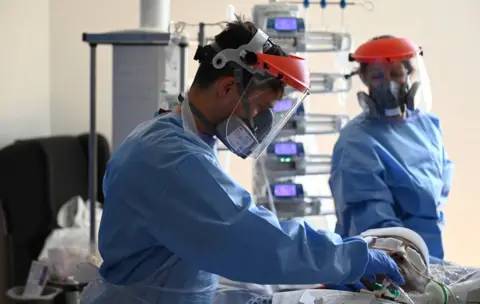Coronavirus: Public spending on crisis soars to £190bn
 Getty Images
Getty ImagesPublic spending on the battle against coronavirus has risen to nearly £190bn, according to latest Treasury figures.
It comes after Chancellor Rishi Sunak announced another £30bn of support in his summer statement on Wednesday.
The extra money is worth nearly £3,000 for every person in the UK - and more than the entire planned health budget for 2020-21.
But despite the soaring cost of supporting the economy, some sectors said they had been "ignored".
Although Mr Sunak said his priority was getting people back to work, he acknowledged that the extra support would not be enough to save every job and prevent further economic hardship.
Direct spending on the crisis, excluding the latest £30bn package, has risen to £158.7bn, Mr Sunak revealed on Wednesday.
Including the new measures, it means the cost of the crisis has risen by more than 40% since last month, when the government's spending watchdog, the Office for Budget Responsibility, estimated it at £133bn.
This extra spending is likely to push the gap between what the government spends and what it raises in taxes - the deficit - above the OBR's latest estimate of around £300bn, according to the influential Institute for Fiscal Studies think tank.
Before the coronavirus outbreak began, the government was expecting a deficit of £55bn.
'Skated over'
The extra public spending figure includes £15bn to buy personal protective equipment such as gloves and masks. It also includes £10bn for the testing and tracing of infected persons, taking the total extra spending on health services to £32bn.
"There is a huge public services additional spending that we didn't really know about that was announced (on Wednesday). It was kind of skated over, but £15bn for PPE for frontline workers is an enormous sum," Paul Johnson, director of the IFS, told the BBC.
He said the chancellor's strategy was to spend money now, to minimise long-term damage to the economy, which would ultimately cause more harm overall.
"I don't think the chancellor is desperately worried about the size of the deficit this year. What will concern him is the size of the deficit the year after, and the year after, and the year after that," he said.
Torsten Bell, chief executive of the Resolution Foundation think tank, said the financial cost of the crisis, at £190bn so far, was "approaching the amount we spend on the day-to-day running of our NHS, schools and colleges each year".
He welcomed the focus on supporting young people and sectors most affected by lockdown, but added: "The scale of support... risks falling short of what will be required. The chancellor is taking quite a gamble on the strength of the recovery in the months ahead."


There are some things no chancellor can prepare for - such as what to do if your economy wipes out 18 years' gains in two months of lockdown.
His solution was to temporarily deep freeze the economy, and pump money into crisis response. And the thawing process needs more funds, to prevent long term damage.
Now economists are talking about a deficit, a shortfall of way more than the £300bn previously expected. It's equivalent to a bigger slice of the economy than at any time since the Second World War.
And it could get bigger; if more is needed to support the recovery - or in the event of a severe second wave.
But it's a cost worth bearing if it carries the economy through a devastating crisis, safeguard the damage to output and jobs - and ensure taxes get paid.
For at some point, there will have to be a discussion about how we pay this back.
The government is currently borrowing record amounts on the financial markets to plug the gap - but that may not be enough. There may have to be tax hikes, possibly less generous rises in pensions.
But it may be a while until the economy is robust enough to bear that.

Concern that the chancellor did not go far enough was underlined by the aviation industry.
The Airlines UK trade body criticised the decision not to extend the furlough scheme beyond October, saying flights were likely to continue to be restricted during the winter.
It would mean more jobs lost in addition to the tens of thousands of redundancies already announced "if the government continues to ignore aviation", a spokesman for the trade body said.
Of the policy measures announced in Wednesday's summer statement, the biggest was the plan to pay employers £1,000 for every furloughed worker they retain past January. The total bill could rise as high as £9.4bn, but only if every furloughed worker keeps their job.
But Charlie Mullins, founder of Pimlico Plumbers, wondered if it was money well spent, as he thought some firms would only retain staff until they get the cash.
"Firms will either want their staff back, or they won't. I just feel some employers will take advantage of this scheme," he told the BBC.

- JOBS: Can my boss force me to go to work?
- HOLIDAYS: Will I get a summer break?
- SYMPTOMS: What are they and how to guard against them?
- FACE MASKS: When should you wear one?
- TESTING: Who can get a test and how?

